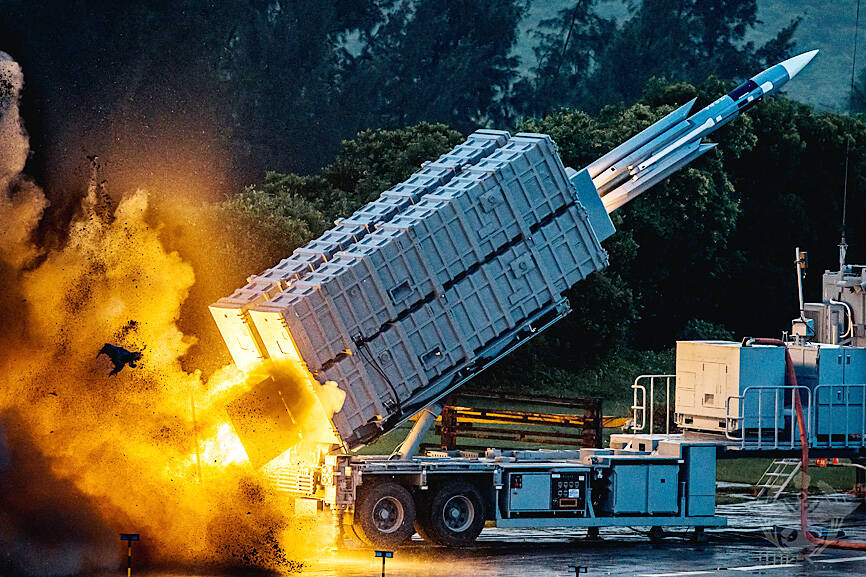More than 1,000 domestically produced missiles are expected to be delivered next year and a production plan would be adjusted according to the nation’s needs, defense sources said on Saturday.
The Chungshan Institute of Science and Technology (CSIST) is manufacturing the missiles as part of its Sea-Air Combat Power Improvement Plan.
The plan has been allocated a special budget of NT$228.9 billion (US$7.4 billion) from last year to 2026, with this year’s budget being the highest at NT$60.9 billion, one of the sources said.

Photo: EPA-EFE / the Ministry of National Defense
Last year’s budget was NT$46.3 billion, while the budget would be NT$47.4 billion next year, NT$45.8 billion in 2025 and NT$28.3 in 2026, the source said.
The allocation is expected to result in the largest delivery of missiles next year to address developments in the Taiwan Strait, they said.
This year’s missile production is estimated to be close to 1,000, the source said.
The overall spending plan includes two phases of mobile coastal-defense cruise missiles, an air-defense system, an uncrewed aerial vehicle (UAV) system, the Wan Chien air-to-ground missile system, the Hsiung Feng II-E (HF-2E) land attack cruise missile system, and two phases of high-performance naval vessels, as well as weapons systems for coast guard vessels, the source said.
The manufacture of the Wan Chien air-to-ground missile system is to be completed next year, while the UAV and the HF-2E missile systems would be ready in 2025, the source said.
Asked whether the government would unveil a second purchase package or raise the annual defense budget to boost weapons manufacturing, a high-ranking official said on condition of anonymity that the government would follow the most suitable plan based on its predictions of how the cross-strait situation would develop.
With the delivery of sea and air missiles, the military would gradually adjust its air-defense, anti-ship and naval units, while retiring old missile systems, the official said.
Countries such as the US, Japan and China are paying attention to the combat power of Taiwan’s missile forces, they said, adding that the military would unveil the outcomes of its improvement plan soon.
In other developments, a source close to the military yesterday said that the army is customizing reconnaissance drones made by the CSIST to give them combat capabilities.
Some of the UAVs have been equipped with a laser targeting system that can lock on to targets and transmit the coordinates to a military base, the source said.
Others would be equipped with weapons systems to give them the capability to retaliate against possible to attacks while on reconnaissance missions, the source said.
The drones being refitted are among the 50 rotor-based models ordered from the CSIST for NT$779.98 million. Fourteen were delivered last year and 36 this year.
The UAV was unveiled at a military demonstration in January. The army at the time said soldiers need only two weeks of training to operate the drones, with refresher courses scheduled every two years.
The drone is 180cm long, 39cm wide and 55.7cm high. It has a top speed of 64kph and can climb to 1,500m.
Weighing 25kg, it can withstand level 6 winds on the Beaufort Wind Scale and can fly for 60 minutes on a single charge.

The Central Election Commission has amended election and recall regulations to require elected office candidates to provide proof that they have no Chinese citizenship, a Cabinet report said. The commission on Oct. 29 last year revised the Measures for the Permission of Family-based Residence, Long-term Residence and Settlement of People from the Mainland Area in the Taiwan Area (大陸地區人民在台灣地區依親居留長期居留或定居許可辦法), the Executive Yuan said in a report it submitted to the legislature for review. The revision requires Chinese citizens applying for permanent residency to submit notarial documents showing that they have lost their Chinese household record and have renounced — or have never

A magnitude 5.6 earthquake struck off the coast of Yilan County at 12:37pm today, with clear shaking felt across much of northern Taiwan. There were no immediate reports of damage. The epicenter of the quake was 16.9km east-southeast of Yilan County Hall offshore at a depth of 66.8km, Central Weather Administration (CWA) data showed. The maximum intensity registered at a 4 in Yilan County’s Nanao Township (南澳) on Taiwan’s seven-tier scale. Other parts of Yilan, as well as certain areas of Hualien County, Taipei, New Taipei City, Taoyuan, Hsinchu County, Taichung and Miaoli County, recorded intensities of 3. Residents of Yilan County and Taipei received

Taiwan has secured another breakthrough in fruit exports, with jujubes, dragon fruit and lychees approved for shipment to the EU, the Ministry of Agriculture said yesterday. The Animal and Plant Health Inspection Agency on Thursday received formal notification of the approval from the EU, the ministry said, adding that the decision was expected to expand Taiwanese fruit producers’ access to high-end European markets. Taiwan exported 126 tonnes of lychees last year, valued at US$1.48 million, with Japan accounting for 102 tonnes. Other export destinations included New Zealand, Hong Kong, the US and Australia, ministry data showed. Jujube exports totaled 103 tonnes, valued at

BIG SPENDERS: Foreign investors bought the most Taiwan equities since 2005, signaling confidence that an AI boom would continue to benefit chipmakers Taiwan Semiconductor Manufacturing Co’s (TSMC, 台積電) market capitalization swelled to US$2 trillion for the first time following a 4.25 percent rally in its American depositary receipts (ADR) overnight, putting the world’s biggest contract chipmaker sixth on the list of the world’s biggest companies by market capitalization, just behind Amazon.com Inc. The site CompaniesMarketcap.com ranked TSMC ahead of Saudi Aramco and Meta Platforms Inc. The Taiwanese company’s ADRs on Tuesday surged to US$385.75 on the New York Stock Exchange, as strong demand for artificial intelligence (AI) applications led to chip supply constraints and boost revenue growth to record-breaking levels. Each TSMC ADR represents